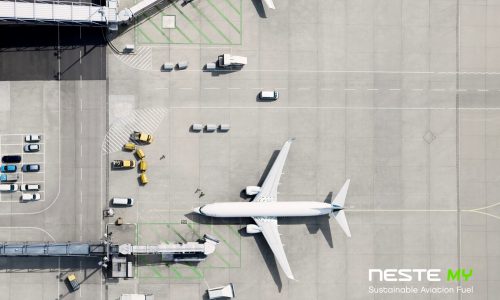Menzies Aviation has joined the Mission Possible Partnership (MPP), an alliance of climate leaders focused on decarbonising some of the world’s highest-emitting industries.
Global aviation is currently responsible for about 3% of total global, anthropogenic CO2 emissions – having seen an increase by over a third between 2010 and 2019 alone. If aviation were unmitigated, it could be responsible for an even greater proportion of global emissions by 2050.
In collaboration with the Clean Skies for Tomorrow coalition, the MPP has published a new Aviation Transition Strategy that has been endorsed by over 60 aviation leaders, setting out a global strategy to achieve net-zero aviation by 2050.
The new report, “Making Net-Zero Aviation possible: An industry-backed, 1.5°C aligned Transition Strategy”, provides a series of actionable steps to be taken over the next decade to secure a transition towards carbon-neutral flying and deliver the goals of the Paris Agreement. Actions include drastically improving fuel efficiency gains of aircraft, the rapid roll out of Sustainable Aviation Fuel and market entry of hydrogen, battery-electric or hybrid powered aircraft.
Menzies, which provides ground, fuel and air cargo services is the first aviation services business to sign the global strategy, reflecting the company’s commitment to its AllIn sustainability strategy. Announced last year, All In encapsulates Menzies plan for making a positive difference to guarantee a fair and sustainable future, notably its ambition to be carbon-neutral by 2033.
John Geddes, Corporate Affairs Director, Menzies Aviation said: “This latest strategy from the Mission Possible Partnership underlines the importance of key players in the aviation industry working together to achieve net-zero. I’m proud that Menzies is involved in this latest effort and look forward to seeing the impact collective action can have to build a more sustainable future.”
Katy Reid, Head of Sustainability & Corporate Responsibility, Menzies Aviation, said: “Our All In Strategy is integral to making our business more sustainable and has set us on course to meet our social and climate responsibilities. This latest report from the Mission Possible Partnership highlights the steps we must take to continue to drive meaningful change, which we will be incorporating into our existing strategies.”
Morven McCrindle, Executive Vice President Fuels, Menzies Aviation, said “As signatories of the Clean Skies for Tomorrow Coalition, we are committed to supporting the acceleration of the deployment of Sustainable Aviation Fuels. SAF will play a vital role in the transition to net–zero aviation so it’s fantastic to see this reaffirmed in the Mission Possible Partnership’s latest report.”
Mission Possible Partnership (MPP)
Led by the ETC, RMI, WMBC, and the World Economic Forum, the Mission Possible Partnership (MPP) is an alliance of climate leaders focused on supercharging the decarbonization of seven global industries representing 30% of emissions – aviation, shipping, trucking, steel, aluminium, cement/concrete, and chemicals. Without immediate action, these sectors alone are projected to exceed the world’s remaining 1.5°C carbon budget by 2030. MPP brings together the world’s most influential leaders across finance, policy, industry and business. MPP is focused on activating the entire ecosystem of stakeholders across the entire value chain required to move global industries to net-zero. www.missionpossiblepartnership.org
Clean Skies for Tomorrow (CST)
The Clean Skies for Tomorrow (CST) coalition provides a crucial global mechanism for top executives and public leaders, across and beyond the aviation value chain, to align on a transition to sustainable aviation fuels as part of a meaningful and proactive pathway for the industry to achieve carbon-neutral flying. The Clean Skies for Tomorrow Coalition is led by the World Economic Forum in collaboration with the RMI and the Energy Transitions Commission. Learn more at www.weforum.org/cleanskies

